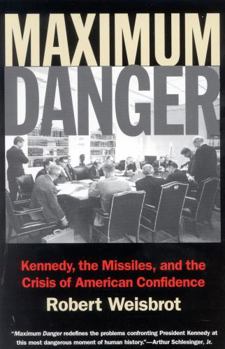Maximum Danger: Kennedy, the Missiles, and the Crisis of American Confidence
Select Format
Select Condition 
Book Overview
In the early 1960s, as a youthful President Kennedy entered the White House, Americans braced for a period of "maximum danger" from the Soviet Union. This nearly universal alarm sprang from rising Soviet missile strength, Communist challenges around the world, and the shoe-thumping bluster of Premier Nikita Khrushchev. Yet popular fears also fed on exaggerated estimates of Russian military prowess, global ambitions, and readiness to risk or even begin a nuclear war. The Cuban missile crisis of 1962, the gravest collision of the cold war, occurred as these alarms were sounding loudest, generating pressures for bolder action to blunt Soviet advances. Historians and other observers persist in explaining President Kennedy's handling of the missile crisis in merely personal terms, as revealing either unique valor and resourcefulness or reckless machismo. In Maximum Danger, Robert Weisbrot moves beyond these now common interpretations to argue that JFK in fact explored no new policy frontiers but rather faithfully reflected a remarkable cold war consensus. Buffeted by partisan sniping, public opinion, and the force of inherited policies, the president pursued a variety of options while trying to minimize confrontation with the Soviets to a degree consistent with his political survival. By exploring the boundaries that national attitudes can impose on even the most popular leader, Maximum Danger bids to recover the historical figure of John F. Kennedy from the veils of myth.
Format:Paperback
Language:English
ISBN:1566634776
ISBN13:9781566634779
Release Date:July 2002
Publisher:Ivan R. Dee Publisher
Length:288 Pages
Weight:0.75 lbs.
Dimensions:0.8" x 5.8" x 8.7"
Customer Reviews
2 ratings
Another cogent analysis of the Kennedy/Cuba crisis
Published by Thriftbooks.com User , 23 years ago
Robert Weisbrot's Maximum Danger provides another cogent analysis of the Kennedy/Cuba crisis: this from the viewpoint of Kennedy's overall attitude toward the Soviet Union's growing missile strength. Weisbrot argues that John Kennedy attempted to minimize confrontations with the Soviets, pursuing different options to avert the crisis. Maximum Danger provides an engaging, thoughtful series of different viewpoints about the missile crisis.
Maximum Danger
Published by Thriftbooks.com User , 23 years ago
"A powerful and provocative look at what the publics view was on the Cuban missile crisis. Maximum Danger reveals startling information from both Republicans and Democrats on Capitol Hill. Robert Weisbort tells the real story of what Kennedy and his administration endured through almost near nuclear holocaust."





